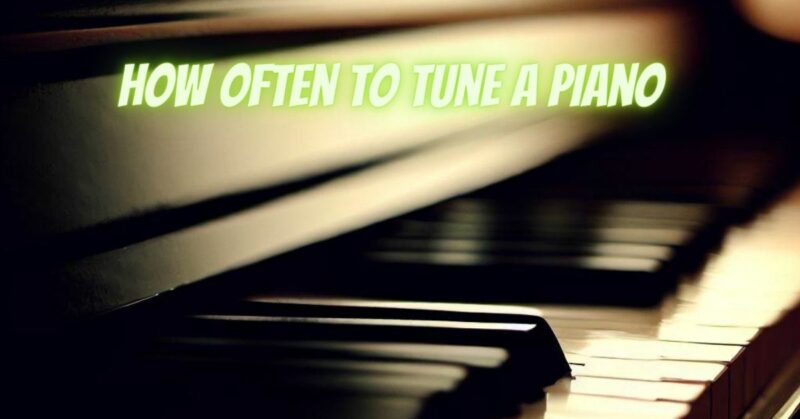Regular piano tuning is essential for maintaining the instrument’s optimal sound quality and performance. Due to various factors such as string tension, environmental conditions, and usage, pianos gradually go out of tune. In this article, we will explore the recommended frequency for piano tuning and the factors that influence how often a piano should be tuned.
- Recommended Tuning Frequency: Piano technicians generally recommend tuning a piano at least once a year. However, it is important to note that the ideal tuning frequency can vary based on several factors, including the piano’s age, usage, environmental conditions, and personal preference.
- Environmental Factors: The piano is highly sensitive to changes in temperature and humidity. Fluctuations in these factors can cause the wooden components of the piano to expand or contract, affecting the tension of the strings and causing the piano to go out of tune. Areas with extreme climate variations may require more frequent tuning to compensate for these changes.
- New Pianos and Piano Break-In: Newly manufactured pianos require more frequent tuning during their initial years. This period, known as the piano’s break-in period, is when the strings and other components settle and adjust to their new environment. As the piano acclimates and stabilizes, the need for tuning may decrease. Regular tuning during the break-in period helps ensure that the piano reaches its optimal sound quality and stability.
- Usage and Intensity: The frequency and intensity of piano usage can affect how often it needs to be tuned. Pianos used intensively, such as those in concert halls, music schools, or studios, may require more frequent tuning due to the increased string tension and playing dynamics. Regular performances, practice sessions, and frequent playing can cause the piano to go out of tune more quickly.
- Personal Preference and Musical Standards: Musicians and piano owners may have different preferences when it comes to the sound and precision of their instrument. Some individuals have a more acute sense of hearing and prefer their piano to be tuned more frequently to maintain optimal tonal accuracy. Pianos used in concert halls or for professional recordings often require more frequent tuning to meet the high standards of performance.
- Neglected Tuning Consequences: Neglecting piano tuning for an extended period can result in the piano going significantly out of tune. This can lead to difficulties in playing, compromised sound quality, and potential damage to the piano’s components. Neglected tuning may also require more extensive adjustments and repairs, increasing the overall cost of maintenance.
Conclusion:
While pianos should ideally be tuned at least once a year, several factors can influence the frequency of tuning. Environmental conditions, piano usage, personal preference, and the piano’s age all play a role in determining how often a piano should be tuned. Regular tuning not only ensures that the piano sounds its best but also helps maintain its structural integrity. Consult with a qualified piano technician to determine the ideal tuning schedule for your piano based on its specific needs and your musical requirements. By giving your piano the attention it deserves, you can enjoy its beautiful sound and preserve its longevity for years to come.


